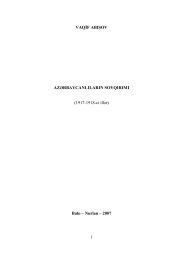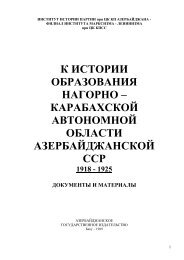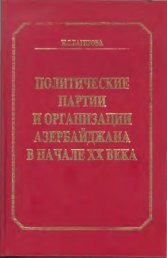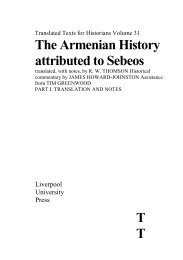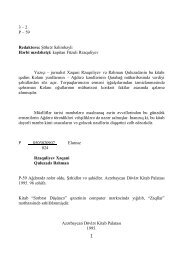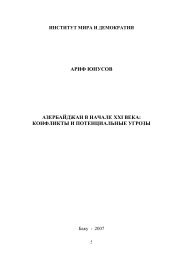ARMENIAN - Erevangala500
ARMENIAN - Erevangala500
ARMENIAN - Erevangala500
Create successful ePaper yourself
Turn your PDF publications into a flip-book with our unique Google optimized e-Paper software.
It is quite remarkable - and undoubtedly painful - that the<br />
Ottoman delegation signed this absurd dictate. There is<br />
one excuse: The capital o f the Ottoman Empire was occupied<br />
by the Allies, and the Sultan was entirely at the<br />
mercy o f the victors. Nevertheless, the Ottoman delegation<br />
should never have put their signature to this dictate.<br />
A refusal could not possibly have worsened the Sultan's<br />
predicament. In the eyes o f the imperial people (the<br />
Turks) and the faithful (meaning all the Moslems o f the<br />
world - the Sultan was, after all, still the Caliph!), it could<br />
only improve. Losing was worse than nothing. At any<br />
rate, the dictate o f Sevres, like the earlier one signed at<br />
Brest-Litovsk, never took effect. Independently o f the<br />
Ottoman government in Istanbul, which in its state o f de<br />
facto imprisonment could no longer speak for the people,<br />
a new Turkish leadership had been formed in central<br />
Anatolia under Mustafa Kemal, who would later be given<br />
the honorary title "Father o f the Turks" -Ataffirk.<br />
The Struggles for Survival o f Turkey<br />
and Armenia:<br />
Both Nations Salvage Their Existence -<br />
The Turks in the<br />
Form o f Traditional Independence; the<br />
Armenians in the Equally Customary<br />
Form o f Lim ited Sovereignty<br />
Following the peace dictates o f Versailles, St. Germain,<br />
Neuilly, and Trianon, a struggle for survival began. It was<br />
the struggle o f a drained, impoverished populace, but for<br />
the states o f the defeated Central Powers this struggle<br />
could at least be carried on within new, "safe" borders.<br />
For the Turks, on the other hand, it was not just a struggle<br />
for the bare survival o f each individual, it was also a<br />
struggle for a piece o f land somewhere where they could<br />
survive. According to the plans o f the Allies, not much<br />
more than the region around Ankara was to be left to the<br />
Turks . . . Everything else was reduced to colonies and<br />
occupied territories o f the Allies.<br />
Two zones o f power promptly appeared on the territory<br />
o f the time-honored Imperial Ottoman commonwealth.<br />
First, there was Istanbul with the Sultan and his government.<br />
They had been condemned to impotence by the<br />
victorious Allies, whose forces occupied Istanbul. There<br />
was still, however, the Turkish heartland - Anatolia. It<br />
was here that the resistance formed . . . "thanks" not least<br />
of all to the invasion o f Greek troops, who were hoping<br />
to inherit the defeated Ottoman Empire. On May 15,<br />
1919, more than half a year after the Armistice o f Mudros,<br />
a mighty Greek expedition corps landed in Izmir,<br />
with the approval o f the A llies. Their objective was to<br />
An Ottoman delegation appointed by the Sultan and led by<br />
Damad Ferid Pasha left Istanbul on June 6,1920 aboard the<br />
French warship "D em ocratic". They were on their way to<br />
Sevres, where on August 10 they would obediently accept the<br />
"peace" dictated by the Allies in much the same way as the<br />
Austrians and Germans had done in Versailles and St. Germain.<br />
The dictate never went into effect, however, because the<br />
Turkish National Assembly refused to accept it.<br />
"finally" realize the megali idea, the "grand idea o f a<br />
Great Greek Empire". Who was to defend Anatolia<br />
against this new, unexpected enemy?<br />
On May 19, 1919, Mustafa Kemal Pasha, disembarked in<br />
Samsun. He was determined to organize and lead the<br />
national resistance. On September 11, 1919 a congress<br />
was held in Sivas. The delegates made it their objective to<br />
maintain the integrity o f "the parts o f the Ottoman Empire<br />
within the borders as they stood at the conclusion o f the<br />
Armistice o f Mudros, October 30, 1918":<br />
" I . The Ottoman Empire which is within the borders o f<br />
October 30, 1334 (1918), the date when the truce between<br />
the Great Ottoman State and the Allied States was signed,<br />
and every part o f which has an overwhelming majority o f<br />
Muslims, constitutes a whole, which will not be divided<br />
for any reason ..."<br />
105



